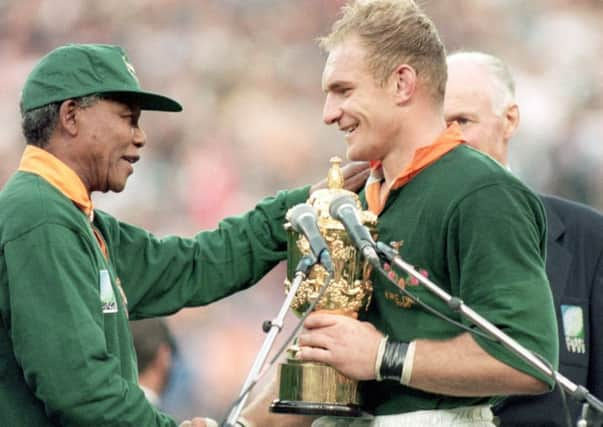Grant Jarvie: Sport is the great uniter


More than 90 heads of state or government gathered in Soweto’s FNB stadium on 10 December to pay tribute to a political leader who fully grasped the idea that sport could be part of a solution, even in the most challenging of circumstances. He was not alone, for others in the assembled crowd – Barack Obama, Ban Ki-Moon, Bill Clinton and Kofi Annan – have all attempted to harness the soft power of sport. But none achieved this as successfully as Nelson Mandela.
Athletes from around the world have not been slow to acknowledge the influence that Mandela had on them. For Muhammad Ali, “he taught us forgiveness on a grand scale”, while Pele said “he was one of the most influential people in my life” and for Usain Bolt, he was “one of the greatest human beings – the world’s greatest fighter”.
Advertisement
Hide AdAdvertisement
Hide AdFrom Mandela’s childhood to lawyer, to prisoner 46664, to South African president (1994-1999) and revered international statesman, sport and the language of sport has never been far away. It was an effective tool in the fight against apartheid, in maintaining dignity and discipline on Robben Island, in forging reconciliation and in not forgetting the past, but forgiving.
For those who assert that sport is just a game, it was not for political prisoners, such as Mandela on Robben Island, who realised that the game made them feel more alive and triumphant, despite the situation they found themselves in, and that it could help them leave the island much better equipped for the future.
They also forgave the fact that for so many years many children of apartheid were denied the right of playing sport on the wider stage – because you could not have normal sport in an abnormal society.
Mandela knew the language of sport – but more than that, he knew how to harness it, capture it’s popular appeal and use it as a medium for carrying messages about freedom, justice, equality and humanity.
It is a language shared by past and current presidents of the United States, who were present in Soweto’s FNB stadium. Former president Bill Clinton, on supporting the US bid to host the 2022 Fifa World Cup, suggested that “few things in the world had done more to help poverty and the poorer nations of the world than football”.
Current president Obama aligned himself with basketball because of its importance in the lives of ordinary American people. It was Obama who reminded us on Tuesday that Mandela taught us not only the power of action, but also the necessity to understand the opposition.
Others present, such as past and current secretary generals of the United Nations, Kofi Annan and Ban Ki-Moon, have also recognised that interventions through sport can at times serve not simply states but also individuals and communities. The UN recently proclaimed 6 April as the International Day of Sport for Development and Peace.
If one builds things around sport, use its capacity to unlock conflict, let it be part of a process, then the prize can at times be greater than the messenger. Sport, Mandela suggested, “had the power to change the world; to unite people in a way that little else does; speak to youth in a language they understand; create hope where once their was only despair”. And, with reference to South Africa, he said of sport: “We have only just started to use it’s potential to build up this country.”
Advertisement
Hide AdAdvertisement
Hide AdIt is significant that since his death on 5 December, sport has been present in many of the timelines marking key moments in his life. For example, on 24 June, 1999, sporting a No6 Springbok jersey, he presented South African captain Francois Pienaar with the Rugby World Cup, but more importantly it created a moment that symbolised reconciliation. If Mandela had previously recognised the power of sport – and in particular the power of the sports boycott to help in the dismantling of apartheid – then, equally, he recognised the power of sport to help with reconciliation. The promise of sport was captured under the African National Congress slogan of “A Better Life for All”. A promise that has yet to fulfil its potential.
It is fitting that this football stadium in the south-west of Johannesburg should be the location of the official memorial service. For it was here that on the final day of the 2010 Fifa World Cup tournament that the crowd chanted “Madiba, Madiba”, many in tears, at being afforded a glimpse of the freedom fighter, boxing enthusiast and, like Obama, the first elected black president of his country. His appearance at the Soweto final of the World Cup was to be Mandela’s last official public appearance.
For those in Scotland who suggest that sport is just a game or that the language of sport should be defined in these terms, the danger is that sport – and Scotland – remain on the sidelines. To do so would be to ignore what Mandela understood so well: not just that sport can help with answering many of the key questions that we face today, but that it also talks to those who simply argue that sport divides.
Sport does divide, but this misses the point in that we can choose to live in a world defined by our differences or we can choose to live in a world defined by our common hopes and aspirations. We can live in a world defined not by conflict, including conflict through sport, or we can recognise that sport can contribute to promoting, justice, equality, nations and communities talking across borders.
There are no easy answers, but it was Mandela, too, that taught us that some things seem impossible until they are done.
• Professor Grant Jarvie is chair of sport at the University of Edinburgh